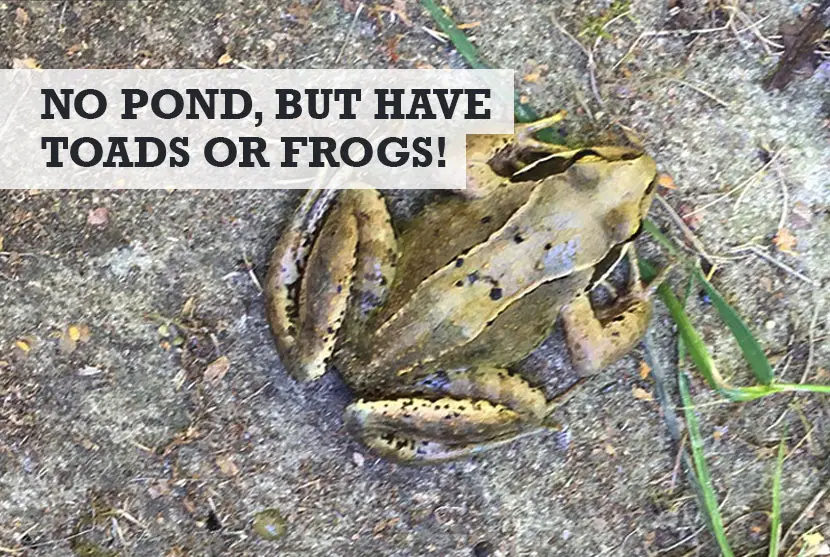Have you found a random toad or frog in your garden or backyard, but are puzzled as to how it got if you have no pond or water source? Well wonder no more, as today I am going to explain just why you have a toad in your garden but no pond.
I will also explain where toads live in your garden and whether it’s good or bad to find them in your backyard. This will help solve the mystery, but first, here’s the short answer.
Why do I have a frog or toad in my garden but no pond? Frogs are found in gardens and backyards with no ponds when dropped by birds, looking for their own insect prey, or searching for a water source. Toads and frogs don’t need be near a pond all the time, and can travel long distances.
There’s a bit more to it than that though. I also have some advice I have on what to do if you find a toad in your garden. All that and more, below.
Why are frogs in my garden with no pond?
Have you ever found a toad or frog in your garden or backyard and wondered where they came from? It’s confusing if you don’t have a pond so you might be tempted to help make sure the little amphibian is safe and makes it back home.
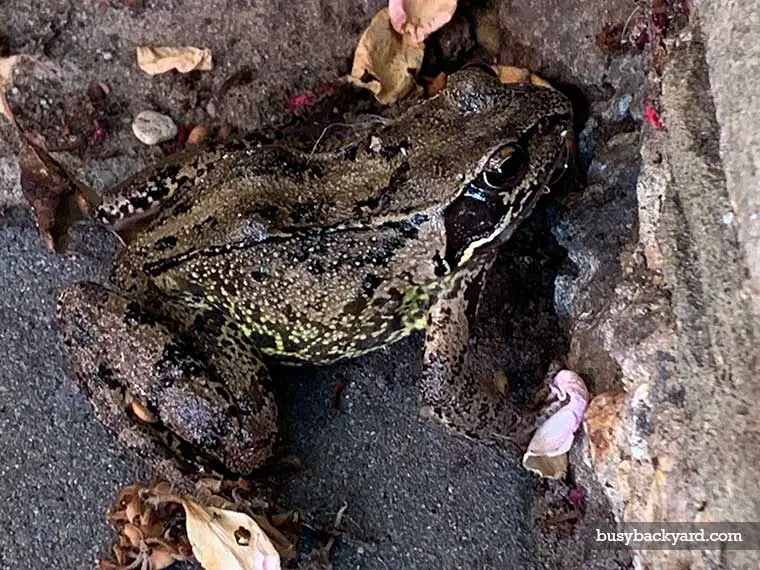
I’m here today to explain why these adventurous backyard friends can stray far from their home ponds and why they might show up in your backyard or garden despite the lack of a pond, no matter what the season.
The bottom line is this; toads and frogs spend more time out of water than they do in water. So, to find a toad in your garden with no pond is not that unusual, and they are very good and finding a water source, so don’t worry too much.
Here’s all the reasons why you have found a frog in your garden but no pond, with some tips at the end on what to do about it if so inclined.
1. The toad or frog is just passing through or searching for prey
As I’ve mentioned, frogs don’t spend all their time in a pond. They typically only enter the water to cool down or breed.
Frogs and toads could have wandered into your backyard and garden to find food before going back to their own pond. It might even be that they are getting enough water in your garden from another source.
They could have wandered intentionally into your backyard garden to get their fill to survive and thrive before continuing their life journey of mating and hibernating.
2. The toad or frog doesn’t need a pond to survive
We used to have two toads living in a bush near a water pipe in our garden, and like you, had no pond. The water would come from the pipe, into the bushes, and soak into the ground. That gave them a wet enough environment to survive.
Amphibians have perfected the practice of maintaining their moisture levels and keeping themselves safe.
Can frogs live in garden without pond? Yes, frogs and toads can live in gardens without ponds providing them can keep themselves damp and moist. Toads do not need ponds to survive providing there is a water source in the backyard.
3. The toad or frog is looking for the pond they were spawned in
Frogs and toads are known to instinctively return to the pond or water in which they were spawned. So, even if you don’t have a pond on your garden today, there might have been one near or in your garden in the past.
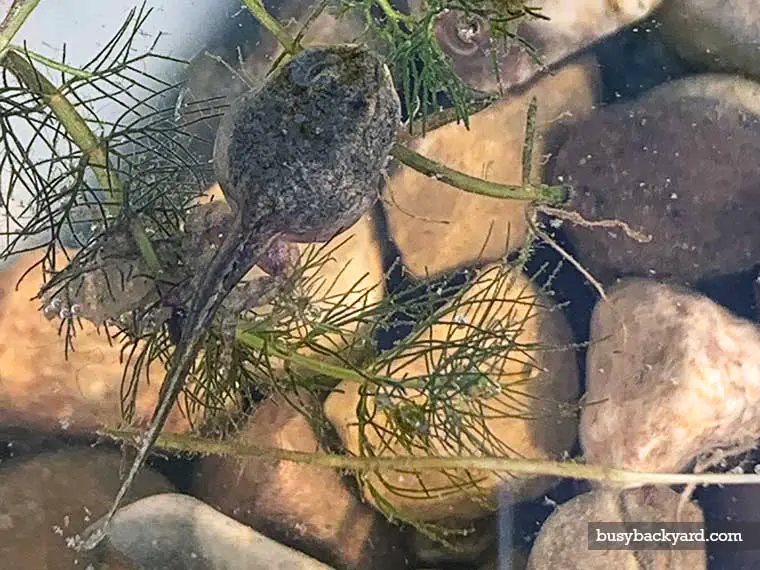
This amazing feat of nature has even been seen after a pond has been filled in with earth, or even after concrete has been laid over the top!
You might even find that the toad or frog has spawned into damp grass or a puddle where the pond might once have been. If you do notice frog spawn out of a pond, try to gather it into a bucket or water and find a nearby pond to put it into.
4. The toad or frog was dropped by another animal
Many different species of birds will hunt frogs and toads as prey. It could be that a bird dropped the frog into your garden whilst flying overhead.
Our own cat also used to catch frogs too, and we’d often have to stop her from bringing them in the house. Do you have a cat who might be partial to catching frogs and bringing them back to your garden?
More advice on toads and frogs in your pond-less garden
Is a toad in my garden good or bad?
Based on what you now know about how the toad got into your garden despite you having no pond, is it good to have toads or frogs in your garden?
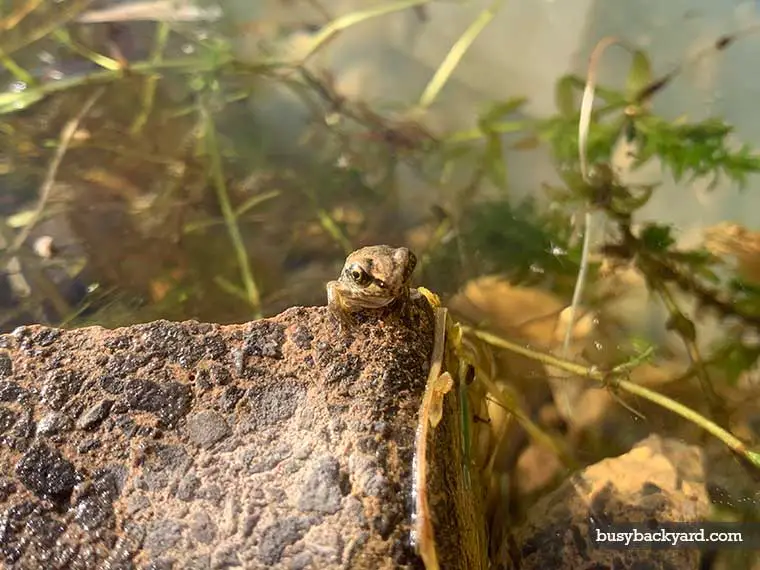
Well, that all depends on your point of view.
Obviously if you live in an area with poisonous frogs, you will not want them in your garden. But putting that to one side, toads can be good for your garden as they will keep pests like flies and mosquitos under control as insects are their prey.
I believe that having a garden that toads and frogs feel welcome in is a good thing, not bad. These amphibians serve as amazing natural pest controllers; it’s said one frog can eat more than 100 insects in just one day – so they could be the solution if you keep finding mealworms in your backyard.
Instead of using harmful chemicals to keep pests and bugs away from your garden, welcome frogs in and let them investigate.
What to do if you find a toad in your garden?
If you find a toad or frog in your garden, you don’t have to move it to a nearby pond or water source. Frogs and toads are very easy to find in the springtime when they’re looking for mates and the weather is generally wet.
They may wander around your yard and investigate the garden but will know how to return home to a pond when they need to. They typically spend a lot of time out of the water and only return to breed or when they need to cool down.
If you find a toad in your garden I recommend you do not even touch it as amphibians have sensitive skin and could be negatively affected and stressed by the contact.
Handy Hint: Did you know that frogs have been known to travel as far as 62 miles in one year and will always be able to find a pond, even new ones freshly dug.
Why do toads keep coming back to your garden with no pond?
A returning frog or toad is a great compliment to the accessibility of your yard. The property might be home to a regular water source such as pipe, or perhaps some tasty insects as a continual source of food in your backyard.
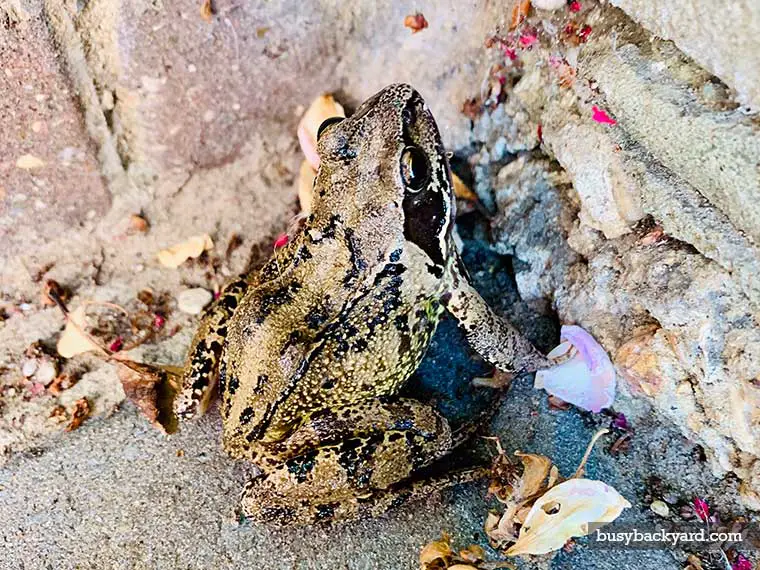
What attracts toads to your yard in the first place if there’s no pond?
If you’re looking to increase the toads in your backyard but don’t have a pond, then there are a few ways to make your garden more accessible and interesting to them.
Firstly, avoid using any chemicals or unnatural pesticides to avoid poisoning or harming the toads. They thrive in natural environments and will enjoy being provided shelter and a cool water source in case they get overheated.
Frogs often do most of their traveling during the night to avoid the sunlight, which can drive them back to their ponds before they’re properly satiated. Tipping over a flowerpot or stacking some rocks could provide the perfect shelter, while a nearby shallow water source could be used in case the toad or frog finds themselves too dry.
What’s the difference between frogs and toads?
I’ve used the name “frog” and “toad” interchangeably in this article, but there are differences between the two. It’s important to know the difference between a frog and toad to better understand what it might need to survive.
Frogs are usually sleek and smooth and will often have a wet appearance. They typically dry out quickly and will frequently search for water to maintain their body temperature. They have long legs made for hopping with pointed noses.
Toads are often bumpy, lumpy, and full of warts with dryer skin. They don’t require as much water and spend a fair amount of time crawling rather than hopping.
Their noses are broader than frogs. It’s important to note that all toads produce toxins and are poisonous. These toxins are usually mild to humans, but it’s important to wash your hands after handling a toad and to typically avoid directly touching or picking them up.
What noises do frogs make?
If you’re hearing some strange noises in your garden at night, it could be a vocal frog announcing their presence to the world despite there being no pond. A frog’s intent can be heard in the sound and tone of their noise, which can include quacks, croaks, grunts and even squeaks.
Different breeds have several noises to announce their search for a mate and some of their noises can be heard up to a mile away. Frogs even can even make a screaming sound to defend themselves if they’re scared or fighting other frogs in their territory.
What do frogs and toads do during the different seasons?
Amphibians must be constantly aware of the seasons and weather to maintain their sensitive body temperatures and needs. Spring is a hot time for frogs and toads as they will be waking up from their hibernation and moving towards ponds and streams to mate.
This is the time of year where amphibians will be spending the most time near or in their water source of choice. As summer begins, they will move into gardens and spend their time in damp and shady areas. At the end of this season, the tadpoles will have grown and leave the water, flooding gardens and nearby yards with baby amphibians.
This outpouring will often diminish as the days and weeks pass, the offspring moving away and finding their own new environment to grow up in and develop – which is when you might find a toad in your garden with no pond.
Fall is the time to bulk up on pests and insects to prepare for the coming winter. Most amphibians will be away from their rivers and ponds and be fully living in yards to spend the most of their valuable time eating.
Winter is a time for hibernation, where frogs will bury themselves in the bottom of ponds and lakes to wait out the coldest weather and toads will find shelter under the dirt and in nooks and crannies.
Conclusion
Next time you find a frog or toad in your garden without a pond, you don’t need to panic. Let them go on their merry way, as they are extremely adept at finding ponds and water.
In fact, if anything, I would encourage them to visit your backyard, as they will hunt down all those troublesome bugs that like to bite YOU!

